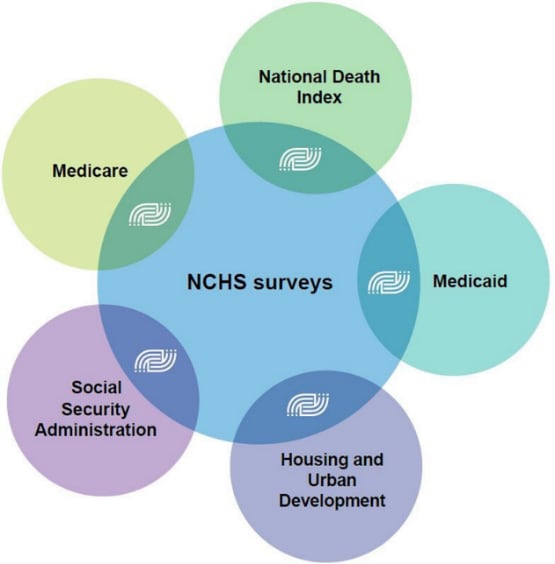Realizing the Power of Data
The National Center for Health Statistics (NCHS) collects data to develop accurate and timely health statistics on the health of the nation and to guide policies and programs created to improve and protect the well-being of the American people.

NCHS links health related data, from multiple sources, so that scientists and policymakers can answer complex health questions relevant to all Americans. For example, NCHS-linked data resources have helped answer key health policy questions including: How effective are federal policies aimed at lowering lead exposure in children living in public housing? Are there adverse health effects associated with the mandatory folic acid fortification policy for grain products? Do persons with disabilities have adequate access to health insurance

Over the past 30 years, NCHS staff have created a robust Data Linkage Program which links NCHS survey data to other sources of health related data such as death certificate information from the National Death Index, health care cost and utilization data from Medicare and Medicaid records, housing assistance data from the Department of Housing and Urban Development, and more. Linking these types of data requires state of the art data science techniques to accurately combine personal identification data such as name and date of birth. Working with this type of information is highly sensitive. NCHS prioritizes data privacy and security throughout the process.
“Our top priority is maintaining the trust of the American people who provide their health information to the government and taking all necessary steps to maintain privacy. For most of our linked data files, public health researchers must access the information through one of our secure Research Data Centers.
We want to verify that the data are used for the benefit of the public’s health and that an individual’s privacy is always protected,” says Lisa Mirel who leads the NCHS Data Linkage Program.
With the growing call for open data and the use of federal data for evidence-based policy decisions, the NCHS Data Linkage Program is well positioned to meet the information needs of the nation. The Foundations for Evidence-Based Policymaking Act of 2018 has established the legislative direction for federal agencies to break down information silos and expand data sharing to address the emerging data-related needs of the country, including understanding social determinants of health and health equity. NCHS continues to meet this challenge through its wide array of data linkage activities, and engagement with the research and policymaking communities to increase awareness of these rich data resources.
“We are not stopping in our efforts to look for new opportunities to increase data linkages and to drive innovations in linked data accessibility” says Lisa. “I’m excited about the work we’re doing to link to new sources of data that provide opportunities to understand the impact of many different factors related to an individual’s health.” The NCHS Data Linkage Program has been hard at work linking an array of data sources to provide a more complete picture of the population’s health and health disparities. “Looking to the future, we are working now to develop the necessary linkages to help understand the impact of public health emergencies, such as the COVID-19 pandemic, to more rapidly inform public health surveillance efforts and to create data resources that will help us understand the longer term impacts of these types of events on the health of all Americans.”
